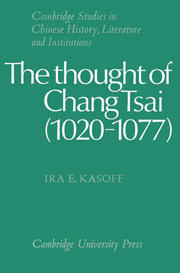Summary
Introduction
Chang Tsai argued that everything in heaven-and-earth consists of ch'i which has condensed from the formless ch'i of the Great Void. This fundamental theory allowed Chang to provide a solution to two problems that occupied the attention of many eleventh-century scholars: ‘of what does human nature consist?’; and ‘if human nature is good, what is the source of evil in the world?’
Chang's theories on human nature follow those of Mencius, who held that human nature is inherently good, but that this good nature is blocked by human desires and emotions. While concurring with this basic position, Chang developed an elaborate theory which was consistent with his views on heaven-and-earth. This theory enabled him to link together morality and heaven-and-earth.
Chang argued that there are two ‘natures.’ One – the heaven-Nature – is the nature of undifferentiated Ch'i, which is the same in every thing and every person, and is perfectly good; the other is the nature of condensed ch'i, the individual ‘physical nature’ of each thing and person. Because the latter can block the development of the former, the individual must strive to overcome the limitations imposed by his physical nature and realize the potential goodness within him. In other words, man possesses both the potential for goodness and a physical nature that can block the realization of that potential. Whether or not the individual realizes his potential depends on his own efforts; what is required in order to realize this potential is ‘learning.’
- Type
- Chapter
- Information
- The Thought of Chang Tsai (1020–1077) , pp. 66 - 103Publisher: Cambridge University PressPrint publication year: 1984



